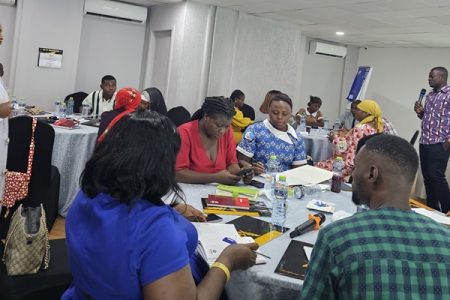Oxfam Ghana, in collaborating with the Ghana Health Service (GHS), has trained 36 healthcare professionals across Ghana on Adolescent and Youth Friendly Health Services (AYFH).
The healthcare professionals included 12 midwives, 12 community health nurses, and 12 general nurses.
The initiative, funded by Global Affairs Canada, under the ‘Power to Choose’ project, sought to equip these healthcare providers with the skills needed to offer judgment-free, rights-based sexual and reproductive health services to young people.
Speaking during the week-long training programme, Project Coordinator at Oxfam Ghana, Fauziatu Abdul- Rahman stressed the need for specialized healthcare approaches tailored to young people.
She noted that without proper attention and support, they might be reluctant to seek essential reproductive health services, highlighting the significance of the initiative.
She stated that the training is part of a broader multi-country project aimed at empowering young people, especially adolescent girls aged 10 to 24, with reproductive health education and services.
The Programme Coordinator added that the initiative is being implemented across five regions in Ghana—Greater Accra, Central, Builsa East, Northern, and North East—and in eight Municipal and Metropolitan Districts (MMDs), including Ashaiman, Effutu (Winneba), Cape Coast, Techiman, Sagnarigu, South Tongu, and West Mamprusi.
Working alongside five key partners—WILDAF Ghana, TPAJ, Planned Parenthood Association of Ghana (PPAG), Participatory Action for Rural Development Alternatives (PARDA), and NSAC, she stated that the project has established safe spaces in schools and communities.
“These safe spaces serve as educational hubs where young people receive information on crucial topics such as family planning, teenage pregnancy, unsafe abortion, and menstrual hygiene management” she explained.
Fauziatu Abdul Rahman indicated that as part of efforts to assess the effectiveness of the training, the project team conducted a pre-test and will conduct a post-test evaluations to measure the knowledge gained by participants.
Additionally, she revealed that there will be monitoring at healthcare facilities to help determine whether more young people are accessing reproductive health services as a result of the training.
“If we see a rise in the number of adolescents seeking these services, it means the training is achieving its goal,
“We will continue to track progress and advocate for policies that support adolescent reproductive health and rights.” she explained.
She added that with continued support from stakeholders, the ‘Power to Choose’ project aims to sustain its impact and ensure that young people across Ghana have access to essential reproductive health education and services to make informed choices about their well-being and future.
A general nurse at Savelugu Municipal Hospital, Zainab Alhassan, described the training as an eye-opener, particularly regarding patient confidentiality.
“There are certain things we have taken for granted as nurses, especially when it comes to protecting the privacy of our clients.
This workshop has reminded us of our responsibility to ensure confidentiality, which is essential in encouraging young people to seek medical care,” she said.
She further highlighted the need for creating safe spaces within health facilities to accommodate the concerns of adolescents.
A community health nurse from Walewale Health Centre in the North East Region, Alhaji Mahamoudu Sadat, noted the importance of community advocacy in ensuring both adult and child access to healthcare.
“The workshop emphasized the crucial role of advocating for adult health services and understanding health rights.
We also learned about the significance of making these services accessible,” he added.
By CHRISTABEL OBOSHIE ANNAN, Accra
- Commonwealth lawyers demand reversal of CJ’s suspension - 10 May 2025
- Cedi to resume depreciation in late 2025, S&P warns - 10 May 2025
- Debt restructuring, IMF deal, gold surge propel Ghana to S&P Upgrade - 10 May 2025

